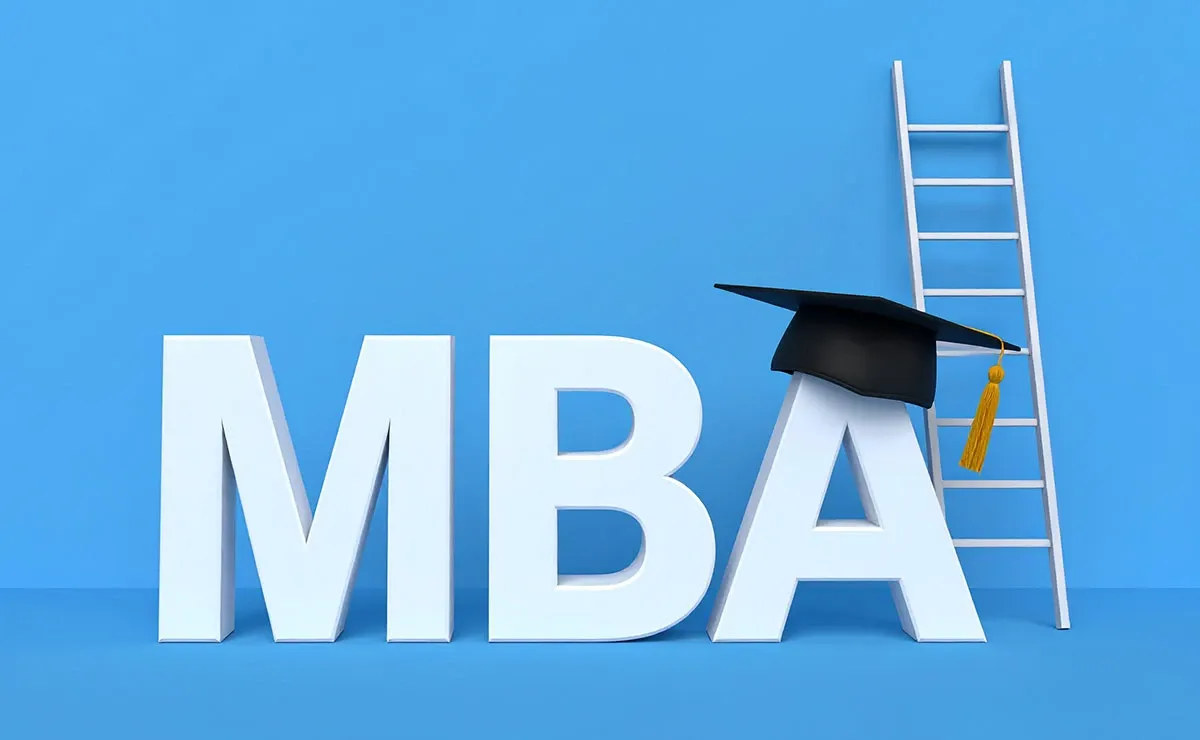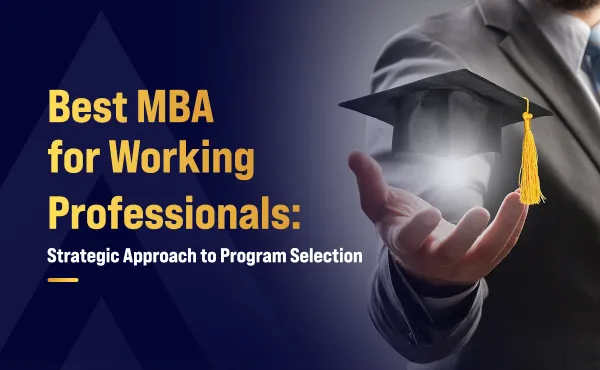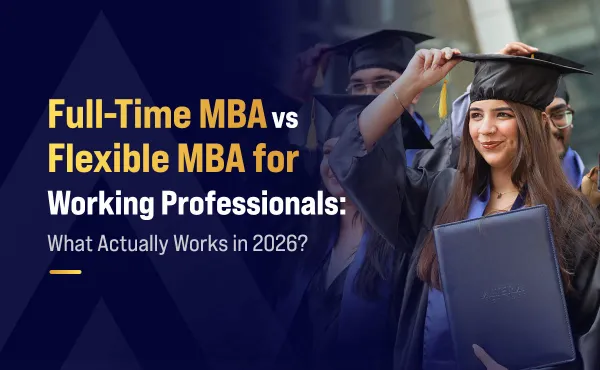Is Work Experience Necessary for an MBA?

If you are a student seeking an MBA for professional growth, you may be wondering if work experience is required to get into college. And if so, what is the minimum work experience required to be deemed eligible for the same?
While not strictly mandatory for all programs, work experience is highly recommended and often a prerequisite for top MBA programs, as it enriches classroom discussions, enhances learning from real-world scenarios, and significantly improves post-MBA career prospects and job placements.
None the less, a portfolio of work can play a significant role in shaping your MBA eligibility and journey, but it’s not always a strict requirement. Let’s explore if work experience is necessary for an MBA, how much experience is typically required, and what alternatives exist for those who have little or no professional background?
The question that is posed by many people is whether work experience is required during MBA since they would like to know whether they can still develop good skills at an early age of their career.
The PGP in Marketing at Altera Institute encourages the freshers and professionals to undergo a learning journey that is practical and placement orientated. In case you are thinking about the options without a required experience, you may refer to our PGP program in the Marketing field.
Work Experience or MBA after Graduation?
The decision to pursue an MBA straight after graduation or to gain work experience first is a personal one. Individual circumstances, career aspirations, and determining the precise MBA college you wish to pursue can all influence your decision.
Both paths offer unique advantages and potential drawbacks, making the decision highly dependent on individual goals and circumstances.

Pursuing an MBA Right After Graduation
For fresh graduates, pursuing an MBA immediately has the following benefits:
- Uninterrupted Learning Curve: As a recent graduate, transitioning directly into an MBA program allows you to continue the momentum of learning. You are already accustomed to academic environments, making it easier to adapt to rigorous coursework.
- Faster Career Start: An MBA right after graduation accelerates your entry into the corporate world while positioning you for better roles earlier in your career.
- Easier Adjustment to College Life: Students often excel at handling academic assignments, group projects, and internships, given their continuous academic experience.
- Building a Strong Foundation: For recent graduates, developing core soft skills such as teamwork, leadership, and time management is crucial to becoming industry-ready.
Fresh graduates may, however, face challenges in competing with candidates with work experience, as they lack real-world insights and practical applications of management concepts. Mostly, business schools desire diversity in class profiles. Hence, they are open to both freshmen and individuals with experience for the program.

Pursuing an MBA After Work Experience
On the other hand, enrolling in an MBA program after gaining professional experience offers its own advantages:
- Practical Context: Candidates with work experience often grasp management concepts better, as they can relate theories to real-world scenarios. This understanding enhances class discussions and promotes experiential learning.
- Career Clarity: Work experience helps identify your strengths, weaknesses, and career aspirations, enabling you to make informed decisions about MBA specializations and the roles you are interested in.
- Higher Employability: Employers often prefer candidates with work experience, as they bring professional skills, such as problem-solving, decision-making, and adaptability, into the workplace.
- Increased Credibility: Work experience demonstrates maturity and managerial potential, which strengthens your MBA application.
In the end, the choice is based on your professional objectives. Pursuing an MBA as soon as you graduate could be the best option if you want to advance your career and are sure of your academic and leadership skills.
However, obtaining job experience beforehand might better prepare you for the journey if you want to pursue senior management positions and seek a deeper grasp of business processes.
How Many Years of Work Experience is Right for you?
The ideal amount of work experience for an MBA depends on the type of program, specialization, and institution you plan to apply to. While most traditional MBA programs do not mandate a strict requirement, executive MBA programs typically cater to candidates with at least 3 to 7 years of work experience. Here’s a detailed look:
Traditional MBA Programs:
For a standard full-time MBA, there is no universal rule on the amount of work experience required. However, most top business schools prefer candidates with 2 to 3 years of experience. These programs also welcome fresh graduates or candidates with minimal experience if they demonstrate exceptional academic achievements, leadership potential, and strong extracurricular involvement.
Executive MBA Programs:
Executive MBA (EMBA) programs cater specifically to working professionals with prior managerial or project-based experience, setting them apart from traditional MBA pathways. Typically, these programs require 3 to 7 years of work experience, with many candidates holding senior or leadership roles.
Where do you draw the line between too little and too much?
- Less than 2 Years: While it is possible to get into an MBA program with little to no work experience, candidates in this bracket often need to compensate with outstanding academic records, strong GMAT/GRE scores, and a clear vision of their career goals.
- More than 6 Years: For candidates with extensive experience, traditional MBA programs may feel less relevant. Such individuals might benefit more from EMBA programs or other specialized executive education.
The ideal amount of experience depends on your career goals and the type of MBA you’re pursuing. For most traditional MBA programs, 3-5 years of experience is considered optimal, as it strikes a balance between professional maturity and adaptability to academic settings.
Is it Good to go for an MBA After 2 Years of Work Experience?

Two years of work experience can be a solid foundation for an MBA, particularly if you've held roles with complex responsibilities and showcased leadership potential. This duration of expertise allows you to have real-world business insights, making the MBA experience more meaningful.
You’re more likely to contribute to class discussions with relevant examples, enhancing both your learning and that of your peers. However, it's important to have clear career goals and reasons for pursuing the MBA at this stage. If you’re still early in your career journey, pursuing an MBA could significantly accelerate your professional growth.
But if you’re not really sure about the direction of your career and how an MBA will help you reach it, then it might be beneficial to gain a few more years of work experience first, so you can make a more informed decision.
Is too much experience good or bad?
Although most people view work experience as an asset, having too much of it might occasionally work against you, particularly if you're applying for traditional full-time MBA programs.
Given that business schools typically target younger professionals with a long career trajectory ahead of them, applicants with 6 or more years of job experience may encounter difficulties. For example, admissions committees might worry that you’re overqualified for certain aspects of the program.
Applicants may also find it difficult to relate to younger classmates or may struggle with the program's core content, which is often geared toward professionals with less experience.
In these circumstances, the candidate must enroll in an Execute MBA (EMBA) program, which meets the requirements of senior working professionals seeking career advancement.
EMBA students have the opportunity to customize their education by selecting electives that better align with their specific career goals. It also offers flexible schedules, such as weekend classes, allowing candidates to balance their studies with their professional commitments.
What Kinds of Experiences are Ideal for an MBA?
When considering an MBA, the type of work experience you bring to the table is as important as the duration. Business schools prioritize diversity and seek individuals who can enhance a vibrant and interactive learning community. Here’s a breakdown of the ideal kinds of experiences that strengthen your MBA application:
Relevant Professional Experience
Experience in industries or roles related to your intended MBA specialization and post-MBA career goals adds significant weight to your application. For instance:
- If your career goal is in finance, roles such as corporate finance analyst, investment banker, or financial consultant are highly relevant.
- For marketing aspirants, experience in brand building, digital marketing, or market research provides a strong foundation.
Relevant work experience showcases your alignment with your goals and allows you to connect MBA coursework directly to your career trajectory.
Leadership and Managerial Roles
Demonstrating leadership potential is always a win for candidates. MBA programs prioritize applicants who have taken ownership of projects, managed teams, or driven significant business outcomes.
Even if your role doesn’t include “manager” in the title, examples of leadership like spearheading initiatives, mentoring colleagues, or managing clients are highly valued.
Exposure to Diverse Roles or Industries
Exploring different roles early in your career can add depth to your profile. For example, working across industries or functions like operations, sales, or strategy demonstrates adaptability and a well-rounded perspective.
It’s equally important to effectively present your career progression on your CV. Mention the skills you’ve gained, the roles you have adapted to, and how these transitions align with your MBA goals.
Before evaluating your work experience, ask yourself: Why do I want to do an MBA? Your answer will shape how you present your experiences, whether they are about gaining business knowledge, advancing in your career, exploring new opportunities, or achieving personal growth.
How Work Experience Affects Your MBA Admissions
Several factors related to your work experience can influence your MBA application’s success. Let’s break them down:
Application Review:
The admissions team evaluates applications by determining how well your professional background fits with your selected MBA program, specialization, and long-term professional objectives. You have a standout application if you demonstrate a clear progression in your career in terms of growing responsibility, complexity of projects handled, and leadership abilities.
The Nature of Work Experience:
While the exact nature of work experience varies across schools, most MBA programs value leadership, problem-solving, and industry-relevant roles. Diverse backgrounds, such as working in startups, NGOs, or creative industries, are also valuable if you demonstrate growth and adaptability. The key is the depth of responsibility and its alignment with your future goals.
Competitive Advantages:
Work experience offers a competitive edge by showing that you have developed practical business skills, which are critical for MBA programs. Such candidates have a better understanding of real-world scenarios, business challenges, and solutions, making them valuable contributors in case studies and class discussions.
Clear Goals:
Work experience helps articulate clear career goals because the past roles of such individuals help refine their ambitions. MBA programs value applicants who know what they want to achieve post-graduation and how the program will help them reach those goals. Your experience provides the context to set these goals and help achieve them strategically.
Easy Transition:
Work experience provides a basic understanding of business operations. So, when you go for an MBA program, it helps you quickly grasp new concepts and apply them in real-world situations. This makes your transition into a business school easier and enhances your learning experience.
Soft Skills:
Professional experiences help people develop important skills like leadership, communication, collaborative teamwork, and problem-solving. These skills are often sharpened in the workplace environment and are highly valued in MBA programs. Well-rounded candidates are given higher preference, as this shows their readiness to pursue an MBA.
Higher Pay:
Having work experience before an MBA increases your potential for higher salaries after graduation. Companies often value candidates who bring experience, leadership capabilities, and a demonstrated track record of success. The combination of your work experience and the MBA degree enhances your earning potential and accelerates career growth.
How Work Experience affect MBA Admissions for IIMs
Work experience is an important but not mandatory criterion for MBA admissions at the Indian Institutes of Management (IIMs). Its impact varies across different programs and institutes, with weightage depending on the type of MBA course and the admissions policies of specific IIMs.
Weightage in Admissions:
IIMs consider multiple factors during admissions: CAT score, academic profile, WAT/GD, personal interview (PI), and work experience. The weightage for work experience typically ranges between 5 to 10 points, varying across institutes.
While experienced candidates gain points for their professional background, freshers can compensate by excelling in other areas like academics and CAT percentage.
Ideal Work Experience Duration:
Generally, IIMs consider 3 years of work experience as optimal. However, both freshers and candidates with extensive experience are eligible for admissions if they showcase strong profiles. Executive MBA candidates at IIMs typically have the highest work experience, while part-time MBA aspirants fall in between.
Challenges for Freshers:
Fresh graduates face challenges in the personal interview (PI) stage as they lack professional exposure. The panel may probe deeper into their academic achievements, extracurricular activities, and motivations for pursuing an MBA. However, excelling in the CAT and presenting a well-rounded profile can offset this disadvantage.
MBA Admissions without Work Experience: Top Colleges other than IIM
Here is a list of some of the best colleges in India, along with their course fees. Other than IIMs, these colleges offer an MBA without work experience.
- Xavier School of Management (XLRI), Jamshedpur: - INR 28.6 L
- Fore School of Management, Delhi: - INR 20.7 L
- Faculty of Management Studies (FMS), Delhi: - INR 2.28 L
- Birla Institute of Management Technology, Ranchi: - INR 14 L
- Symbiosis Institute of Business Management. Pune: - INR 24.2 L
- The Altera Institute of Management, Gurgaon: - INR 13.4 L
Is Work experience necessary for MBA Abroad
Yes, work experience is typically necessary for admission to top MBA programs abroad. It demonstrates maturity, skill development, and the ability to contribute to the learning environment. Here’s what universities expect, although requirements vary by region and school:
- United States: Harvard, Stanford, and Wharton prefer 3-5 years.
- Europe: INSEAD and LBS accept 1-6 years, with 2-3 years being common.
- Canada/Australia: Generally, 2-4 years.
Executive MBA programs often require 8-10 years in senior roles, while deferred MBA and early-career programs accept minimal or no experience. Research your target schools to align your application with their expectations and emphasize the relevance of your professional background.
MBA Abroad Without Work Experience: Top Colleges
Below are some of the best colleges to pursue an MBA abroad, along with their fee structure.
- Wharton MBA - University of Pennsylvania: - INR 72.2 L
- University of Northampton, England: - INR 16.6 L
- Columbia Business School, New York: - INR 71.3 L
- University of California, Berkeley: - INR 69.3 L
- Carleton University, Canada: - INR 24.1 L
How Work Experience Affects MBA Admissions: Executive MBA
For Executive MBA (EMBA) programs, work experience is crucial. These programs cater to senior professionals with significant managerial experience, usually with 8-10 years or more in the workforce. With an emphasis on leadership growth and strategic decision-making, prior professional experience becomes even more critical for EMBA programs.
FAQs
Q1. Is work experience necessary for an MBA in the United States?
Ans: Work experience is highly valued for MBA admissions in the USA. Prestigious academic institutions like Harvard, Stanford, and Wharton mandate a robust professional foundation, typically spanning 3-5 years of comprehensive work experience.
However, some programs, like deferred MBA options or early-career MBAs, accept fresh graduates, provided they have a strong academic background and extracurricular achievements.
Q2. Is work experience necessary for an MBA in India?
Ans: Work experience is important but not mandatory for MBA admissions in India. Prestigious institutions like the IIMs give weightage to work experience, but many fresh graduates also secure admission with excellent CAT scores, academic performance, and interview preparation.
Executive MBA programs in India, however, require substantial work experience (typically 5-10 years) as they cater to mid-career professionals.
Q3: How much does an MBA without work experience pay?
Ans: The pay for MBA graduates without work experience can vary based on the institution, specialization, and industry. In India, fresh MBA graduates from top-tier institutions like IIMs or XLRI may start with salaries ranging between ₹10-30 LPA.
Lack of work experience can limit job roles and earning potential compared to peers with professional experience, but strong internships and networking can offset this gap.
Summing Up
Work experience is an important factor for MBA admissions, especially at top-tier schools, but it’s not always a strict requirement. The decision to pursue an MBA immediately after graduation or after gaining work experience depends on individual career goals, aspirations, and the program’s requirements.
While professional experience can enhance learning, employability, and earning potential, fresh graduates with exceptional profiles can also succeed with the right preparation. Ultimately, aligning your MBA choice with your personal and professional objectives is key to maximizing the value of your degree.





